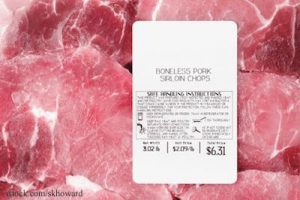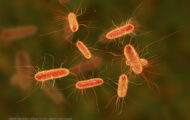It kind of got lost in all the good vs. evil stuff and cool CGI, but tariffs were a significant part of the plot in Star Wars. They’re also a plot point of a protracted disagreement between the U.S. and Canada about country-of-origin (COOL) food labels: COOL wars.
 Historically, COOL labels have had mixed success at accomplishing their goal: providing consumers with helpful information so they can make informed choices. If you know that Country A is known for the high-quality kiwi it produces and that they’re sticklers for food safety, when you see kiwi at the market with a sticker or sign that says: Product of Country A, you will put them in your cart. And roll right by if the converse is true. But when an animal is born in one country, raised in another and slaughtered in yet another, the COOL label on the meat it provided will read “mixed origin” or something like that. What does that tell you?
Historically, COOL labels have had mixed success at accomplishing their goal: providing consumers with helpful information so they can make informed choices. If you know that Country A is known for the high-quality kiwi it produces and that they’re sticklers for food safety, when you see kiwi at the market with a sticker or sign that says: Product of Country A, you will put them in your cart. And roll right by if the converse is true. But when an animal is born in one country, raised in another and slaughtered in yet another, the COOL label on the meat it provided will read “mixed origin” or something like that. What does that tell you?
Not much, according to agriculture and trade officials in the U.S. who have been working, since 2008, to make these labels more meaningful to meet the information demands of American consumers. In a recent poll, 90 percent of Americans surveyed said they want to know where their meat came from and they want the the labels on it to say so. Who would have guessed that one of the things Americans all pretty much agree on was COOL?
So, in May, the U.S. Department of Agriculture published its final rule on COOL which eliminates the mystery of “mixed origin” and lists the country or countries where the animal was born, raised and slaughtered, so “born and raised in theU.S., slaughtered in Canada,” for example. The rule was cheered by consumer groups and jeered by Canada, Mexico and the National Cattlemen’s Beef Association, which feared discrimination from trading partners and the retaliatory tariffs that Canada had been threatening all along.
On Friday, the Canadian agriculture and trade ministers published a list of U.S. products that will be the target of retaliatory tariffs if the World Trade Organization decides that the USDA’s COOL rule isn’t fair to its trading partners. The list includes: live cows and pigs, meat and poultry, cheese, apples, cherries, corn, bread, chocolate, wine, frozen orange juice, ketchup, cereal, swivel chairs, wooden furniture and stainless steel.




